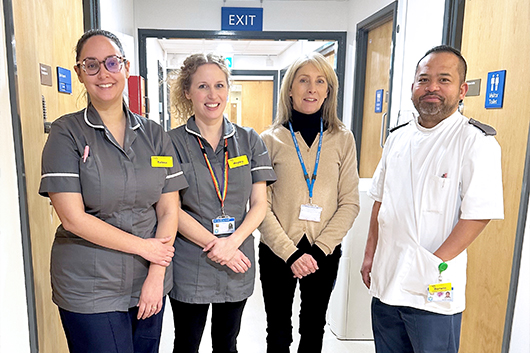Media Release
Date: 29 October 2025
RUH researchers launch new stroke study
This World Stroke Day (Wednesday 29 October) researchers at the Royal United Hospitals Bath NHS Foundation Trust have launched a new recruitment drive for a study looking at how two different medications might help people who have suffered a particular type of stroke.

The national LACunar Intervention (LACI) Trial-3 is investigating whether two types of oral medication - isosorbide mononitrate and cilostazol – may help patients who have had a cerebral small vessel disease (lacunar) ischaemic stroke.
Around 25% of strokes are caused by small vessel disease in the brain. When these vessels become damaged, the interruption of blood supply to the brain can cause lacunar stroke. This can affect about 35,000 people each year in the UK. Small vessel disease can also lead to problems with cognitive function – thinking, balance and walking – and sometimes lead to dementia.
As there are no treatments for small vessel disease, this study is looking at the use of two drugs that are used for other diseases to see if they help to prevent the small vessel disease from causing another stroke or negatively impacting cognitive function.
Hayley Stoney, RUH Stroke Research Nurse, said: "Lacunar stroke is quite common but can still have very serious consequences for people, particularly the way it can affect people's thinking, balance and walking.
"We're really proud to be part of such an important study which has the potential to make a real difference to the quality of life of people who have already had a stroke, and others in the future too.
"I would appeal to anyone who could be part of the trial to get in touch and find out more – you will be playing a vital role in shaping the future of treatment for stroke patients."
The study is open to patients aged 30 and above who have had a lacunar ischemic stroke involving the small blood vessels. They must have no other active neurological disease, for example multiple sclerosis, recurrent seizures, or neurodevelopmental disorder.
Those who volunteer for the study will be involved in the trial for around 18months. After an initial assessment at the RUH, trial participants will have their progress checked through telephone calls, avoiding the need for regular visits to the hospital.
To volunteer for the trial, or for more information, contact the RUH's stroke research team on 01225 824120 or ruh-tr.strokeresearch@nhs.net
The LACunar Intervention (LACI) Trial-3 is being run by the University of Edinburgh and the University of Nottingham and is funded by NIHR (National Institute for Health and Research).
ENDS


